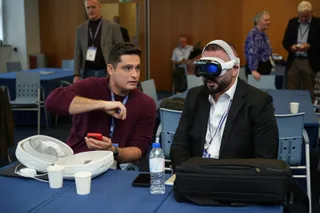Meet the L3Harris-NASA eVTOL Trainer Prototype
Contact Our Team
For more information about how Halldale can add value to your marketing and promotional campaigns or to discuss event exhibitor and sponsorship opportunities, contact our team to find out more
The Americas -
holly.foster@halldale.com
Rest of World -
jeremy@halldale.com

Sanjay Kaeley, Head of Product Solutions, Commercial Training Solutions at L3Harris, drew our attention during WATS 2023 to another future-leaning part of the company’s portfolio – a prototype eVTOL training device. Kaeley noted L3Harris is “aligning ourselves with some of the technologies the industry is talking about that can be used, such as virtual reality, mixed reality and others.” But rather than chasing the technology, L3Harris is ready to “flip the technology on its head by creating a physical concept device which enables us to start collecting data to prove whether or not it’s an effective training device.”
In this case, L3Harris is advancing its eVTOL prototype with NASA, other industry partners and its own cadre of aviation trainees within its training services division, in order to run a scheme of developing a basic curriculum that takes this benchmark device and some of the technology concepts, and moves them between different fidelities of devices to see how effective that training can be delivered.
“Could it be that a fixed-base or a device with a short-term motion system with a VR headset is effective against a traditional full-flight simulator? Well, we’re going to capture some of those data sets to say here is the maximum data that can point you to the type of device that can deliver that training.”
Of added importance, Kaeley and his eVTOL team colleagues are taking the architecture from L3Harris’ FFS as the foundation for the protype eVTOL device. “That way we can certainly convince the authority that ‘we’re coming from a DNA’ and one can recognize it. We’re trying to say we’re coming at it with the DNA of well-trusted training devices with many hundreds and thousands of them out there – approved.”
The fundamental core software for the eVTOL training device is being provided in-house. An unspecified S&T industry strategic partner is developing “the simulation elements” of the device. Kaeley continued, “We’ve also gone with massive validated eVTOL models so we quickly bring them into the simulation space. We’re introducing turbulence and malfunctions, and we’re doing that now rapidly. We’re working with a number of unspecified OEMs to do this as we understand there is a much longer path to actually developing the vehicle – this helps accelerates it.”
L3Harris expects to have a prototype eVTOL training device and accompany data sets ready for a regulatory agency’s initial review in first quarter 2024.


